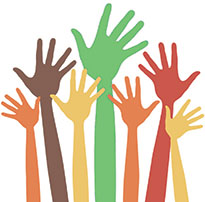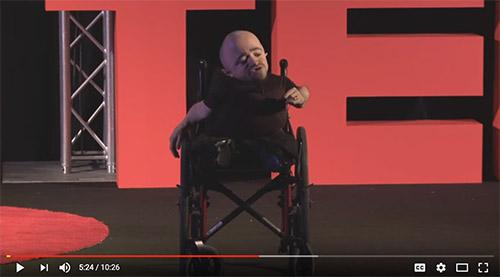RAISE E-News, Vol. 3, No. 4
AUGUST 2017
|

Welcome to the RAISE e-news letter, designed to identify and share resources that the Rehabilitation Services Administration Parent Training and Information Centers (RSA-PTI) can use and share with families.
Executive Editor: Peg Kinsell
Visit our Website:
|
About RAISE
RAISE, the National Resources for Access, Independence, Self-Advocacy and Employment is a user-centered technical assistance center that understands the needs and assets of the RSA-PTIs, coordinates efforts with the TA provided by PTI centers and involves RSA-PTIs as key advisors and partners in all product and service development and delivery.
RAISE is funded by the US Department of Education to provide technical assistance to, and coordination of, the 7 PTI centers (RSA-PTIs). It represents collaboration between the nation's two Parent Technical Assistance Centers (PTAC) and the seven Regional PTACs.
Find your Parent Technical Assistance Center (PTAC)
|
|
 |
Relationships
This month, we focus on tools and resources you can share with schools, transition leaders and families to help them assist students in building skills needed to build positive lasting relationships, starting with a positive relationship with oneself.
"Never believe a prediction that does not empower you."
- Sean Stephenson
|
Sean Stephenson

Motivational speaker Sean Stephenson has a gravely voice that some say lends itself to comedic humor, and he claims to be an expert on only ONE thing... how to be himself. His positive message of self-empowerment and self-love is universal.
"If someone pities me, they are wasting their time," he says.
Join the nearly 2.6 million viewers who have listened to his TEDx talk.
|

TOOLS THAT WORK:
This 84 page guide, developed by the University of Minnesota's Research & Training Center on Community Living, Institute on Community Integration, includes self-directed activities designed to help students with disabilities better understand and value the gifts and interests they bring to relationships.
|
RESOURCES:
Talking Tips for Parents from Sexuality Educators
The State of Massachusetts compiled 43 pages of resources designed to help parents and educators working with youth with disabilities better understand relationships and sexuality. The resources, most of them free of charge, come in a variety of mediums - books, videos websites, and helplines.
The guide includes these talking tips for parents of youth who have disabilities:
- Start early and talk often: Remember, the more you do it, the easier it gets. Keep it simple; provide simple, direct explanations, using words they can understand. Long explanations can be unnecessary, or more confusing.
- Be "askable": Make it clear that they can ask you anything, as well as seek help to find the answer together.
- Use correct terms that prepare children to talk about their body and experiences: Knowing the real names for their body parts makes it easier to communicate about them. Share the changes that will happen to their body and moods before puberty starts.
- Try multiple teaching techniques: Present information through pictures, books, videos, or social learning models, including role-play or asking, "What would you do if..." This helps you reinforce your message and find out how they prefer to learn.
- Use "teachable moments": You can start a conversation naturally while you're watching television or people interacting, reading a book or listening to music together.
- Don't feel like you have to have all the answers: It's okay to say, "That's a good question! I'm not sure about the answer but let's find out together," or "Let me think about that one," if you need more time or information to confidently answer.
- Discuss your values and expectations, and consider theirs: Be willing to hear their entire question or story before responding. If you disagree, explain your concerns (safety, school rules, family expectations, laws, etc.) and come to a solution together.
- Model and teach helpful social skills, including self-esteem: Feeling good about yourself and worthy of being treated well helps prevent high-risk behavior and abuse.
- See your son/daughter as a whole person capable of experiencing romantic love and affection: Remember that learning to navigate dating, relationships and healthy sexuality are normal developmental tasks best accomplished with your guidance and support.
- Encourage independent thinking and action, decision-making skills and boundary setting: Give them support to make choices and decisions that are right for them. Show them how to set boundaries and respect the boundaries of others.
- Expose them to a variety of social situations and experiences: Create opportunities for them to build a peer support system. Provide both appropriate supervision and opportunities for privacy.
- Teach them about consent and how to powerfully say no (or, yes): When children are little, you can teach them "no, go, tell." As they get older, reinforce the need to both clearly ask for, and give or refuse consent to dating, relationships and sexuality
- Guide them to access ongoing sources of information and support: Help them find medically-accurate, developmentally appropriate resources they can access independent of you, whether it is another trusted adult, healthcare provider or website.
Prepared by a partnership between the Massachusetts Department of Public Health (MDPH) and the Massachusetts Department of Developmental Services (MDDS) ©2014.
|
 A CLOSER LOOK: A CLOSER LOOK:
(Sex)abled: Disability Uncensored
We love this 15-minute documentary about sexuality and disability, produced by Health Equity Institute. It playfully and directly addresses stereotypes that hinder sexual growth. It covers topics and contains language that some may find offensive or shocking. We like it because it takes on intimate and tough topics around sex and disability in an honest and funny manner that will resonate with many youth.
Virtually Friends
Sometimes, a friend lives in your town or works with you, but increasingly, many relationships are "virtual." Learning how to make friends and stay safe on social media is vital. We love this advice about posting photos from sexuality educator, Katherine McLaughlin.
She writes:
- Posting photos online can be really fun. You can see what other people are doing on Facebook and Instagram, and share photos of you as well.
- Remember, anything you post online is considered PUBLIC.
- Public photos are: being with friends at a park, visiting your cousins in Virginia, having Thanksgiving with your family, and a picture of you with your sweetheart. Naked pictures are private photos.
- Remind people that before posting or texting words, to ask, " Would I want this to end up in the newspaper of the town I live in?"
- Some people like to send their sweetheart sexy pictures through texting. You might think this is okay because it is to your sweetheart, but that person could send the photo to others and this could cause a lot of problems for you.
- If anything bad happens to you online, talk with someone you trust to help you sort it out.
Learn More >>
©2017 Katherine McLaughlin, Disability Workshops
|
 Upcoming Events Upcoming Events
PA Community on Transition Conference - Pathways to Success
August 9 - 11, 2017, in State College, PA
The National Home and Community Based Services (HCBS) Conference
August 27 - 31, 2017, in Baltimore, MD
National Federation of Families for Children's Mental Health
|
 PARTNER PROFILE: PARTNER PROFILE:
National Federation of
Families for Children's
Mental Health
National Federation of Families for Children's Mental Health is a national organization that is focused on the issues of children and youth with emotional, behavioral, or mental health needs and their families.
|
|